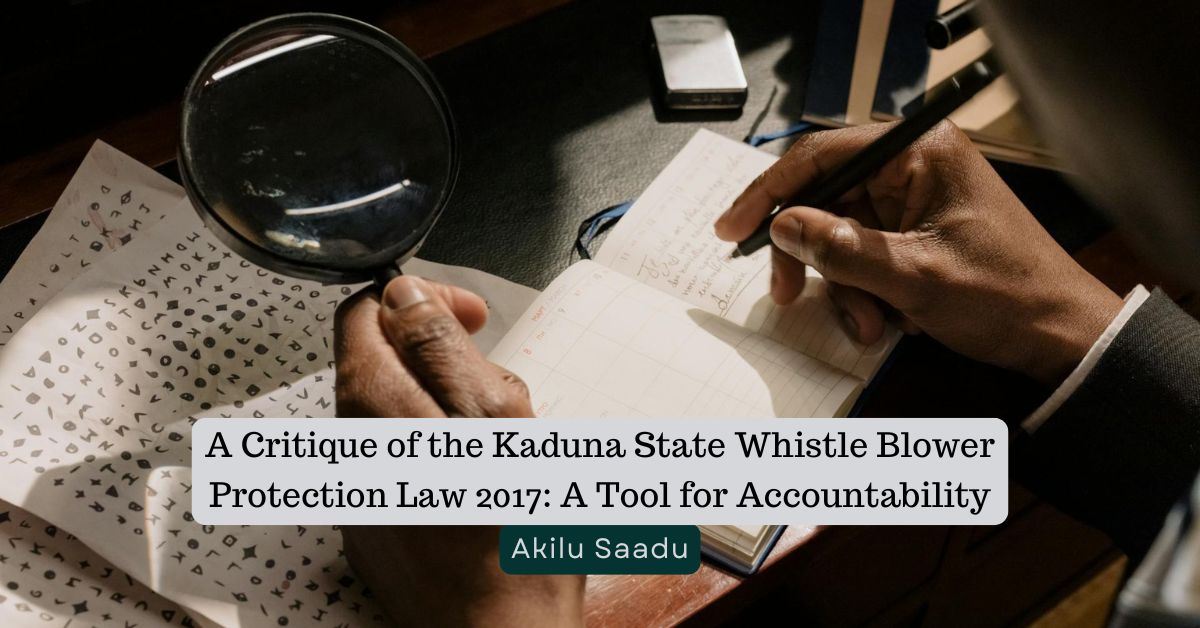A Critique of the Kaduna State Whistle Blower Protection Law, 2017: A Tool for Accountability
In Nigeria today, many of the organisation and public institution are dwindling or better collapsing as a result of impropriety, corruption, mismanagement and embezzlement of public resources . Despite the security and corruption protection agencies scrutiny , the impropriety is yet to be curtailed.
Although, it is the constitutional duty of every citizen to ‘render assistance ‘ and uncover any practice that will endanger the peace, order and sanity of public in every organization or association. Yet there is no instruments of enforcing this right and even when a citizen volunteers to ‘blow” the hidden abnormalities in his ministry ,he will be victimized, prejudiced and punished by the top-echelon members of his organization.
Therefore, the Kaduna state in order to enhance and encourage democracy and transparency in public service enacted this law . And this article intends to highlight the relevance of this law in ensuring a safe, transparent and accountable administration in Kaduna state.
Kaduna State Whistle Blower Protection Law, 2018
Generally, Section 24(e) of the Nigerian constitution made it a duty upon all citizen to “render assistance to the appropriate authority” for the mainatince of law and order in Nigeria. In fulfilment of the above constitutional mandate , any person who exposes the illicit behavior or unlawful acts in any organization or ministry is regarded as “whistle blower ” and in Kaduna state this law is purposely designed to protect such person.
Section 4 of this law defined whistle blower as a person who discloses or make a disclosure that:
a. An economic crime has been commitee , is about to, or is likely to be committed
b. A person has not complied with a law or is in the process of breaking a law or is likely to break a law.
c. A person has maintains a standard of living above that which is commensurate with his or her current or past known sources of income or assets
d. A person is in control or possession of pecuniary resources or property disproportionate to his or her current or past known sources of income or assets
e. A miscarriage of justice has occured , is occuring or is likely to occur
f. In a public institution there has been , there is or there is likely the be waste , misappropriation or mismanagement of public resources
g. The environment has been degraded , is being degrade or is likely to be degraded; or
h. The health or safety of an individual or a person of an individual or a community is endangered,has been endangered or is likely to be endangered .
However, for a person or a “whistle blower” to be protected by this law his disclosure must be purposely made on good faith, with a reasonable cause to believe that the disclosure is true,and “must” be made to the appropriate authority outlined under section 6(1) of the law (see generally section 5) the reason for these conditions is to avoid malicious and fallacious disclosure based on personal vendetta, or interests.
Beautifully, the learned draftsmen of this law recognized the level of civility in some other part of the state and the lack of writing skills which will/may hamper the successful exposure of the atrocious Activities in public enterprises , thus, the law recognized under section 7(1) of this law that the procedure for ‘whistle blowing’ can be made in writing, orally or by an electronic gadgets (e.g phones, recorder etc) . This section tends to widen the procedure in order to accommodate every intended ‘whistle blower ‘ .


Leave a Reply